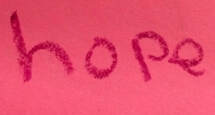 Hope has never come easily for me. I’m a natural cynic, so I’ve always believed hope was a virtue for fools. It seemed naïve, childish, indulgent. I considered myself far too much of a realist for such nonsense. Hope just seemed embarrassingly earnest, like admitting that I wanted more would just be setting myself up for failure when it didn’t happen. My problem with hope was that I never expected it to actually work, so I never gave it a fair chance. I never bothered with hope. Until I had to. The family we have created through foster care is absolutely dependent on hope. Every child we call ours has come from a hopeless place, and I have had to learn to hope for their sake. But this has its challenges. I’ll admit, I often feel ill-equipped to the task. For so long, I have feared hope, because hope demands change. You only need to hope when you want things to be better. In order for anything to improve, change must occur. I have never liked change. I like things in my life to be predictable, constant, safe. (I married an Eagle Scout. I have an iPhone. My car has a 200,000-mile warranty.) But these kids come to us from places of total disruption and chaos. There is nothing predictable, constant, or safe about their lives when they arrive. Change is thrust upon them, and I am instantly part of their change, like it or not. Change is hard, even when it is for the good. It’s uncomfortable and scary, yet in this change lies the opportunity for growth. Hope requires a certain tolerance for the discomfort of change. It means looking forward with joyful anticipation as you navigate the transformation ahead. In this way, hope is equal parts dissatisfaction and optimism. Hope is the journey, never the destination. It’s a road trip virtue, a belief that you’re headed somewhere good, somewhere better, even if you aren’t entirely sure where it is or what it will look like when you get there. Hope dares to ask, “What if…?” while walking confidently toward it. Hope is the relentless belief that blessings exist on the other side of change, and hope is the courage to pass through those changes like a refiner’s fire. I have often been too impatient for hope. I want the harvest without the growing season. I want to enjoy the result without enduring the change, but hope means bearing the awkward ugliness of change with patience and grace, always believing that things will improve. Hope is raising a caterpillar in a jar. Or a teenager in your spare bedroom. I am learning how to hope by providing these foster children with opportunities to flourish, by helping them bridge the gap between their circumstances and their dreams. Watching our foster children reach beyond their circumstances and grab hold of more is hope in action. And as I bear witness to such hope arise in them, they give me hope in return. It’s a beautiful, continuous loop of possibility.
1 Comment
Sarah
3/11/2022 10:01:12 pm
Hi. Thank you for writing so pure and honestly.
Reply
Your comment will be posted after it is approved.
Leave a Reply. |
Old Stuff.
January 2023
Categories.
All
|

 RSS Feed
RSS Feed


